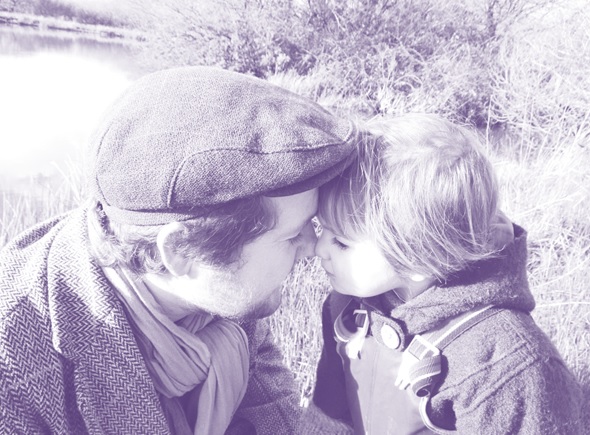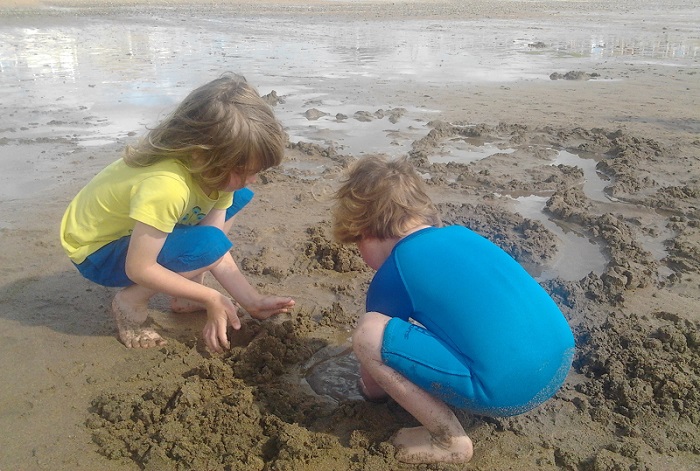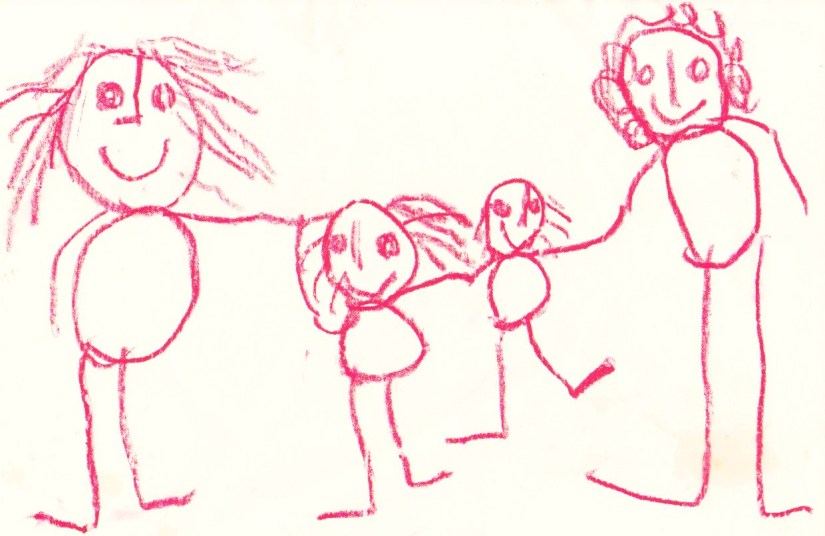
A new year is here. I’m always excited about a new beginning. So many new opportunities and so many things I can try to achieve. Personally, I don’t much believe in new-year-resolutions. I don’t want to pressurise myself and then feel depressed by the end of January when I need to confess that all resolutions actually don’t work. Again.
So, this year I came up with a list of things I just want to continue doing and working on. But also I added things which I think would be great to try out. And I want to invite you, fathers on this planet, to join me. Pick the things you like and go ahead creating your own list. Whatever you choose to do, I believe in your own creativity and fatherhood power. Be my guest:
1) Love your children unconditionally. Yes, there a plenty of moments where they gonna mess up; where they drive you insane, and where your only safe place is the locked bathroom to get at least five minutes peace. Tantrums, scream fits, broken things and even lies. It’s all part of the package. But, they are still the most magnificent and wonderful people on this planet. So, forgive, reconnect, give the love you would have hoped for when you were a kid and screwed up. Why did I put it here as Number 1? Because it’s my personal reminder and the most important thing to me when it comes to parenting and fatherhood.
2) Spend more time with your kids. Since I’m a father myself I can confirm this: Time flies. It’s such a precious time. And your children are only little once. Before you blink twice they’ve grown up and go their ways. You’ll still be part of their life (hopefully), but it’s nothing compared with the first years. So, get down onto the floor, or in the sandpit, or into the woods and play. When you join their games be present and follow your kids’ rules.
3) Take a step back: Watch your kids. Observe how they play and what they like. Try to see things through their eyes. Listen to them. Not only their words, but also intonation, face expression and body language. This way you’ll learn a lot about them and yourself. Promised.
4) Hug your kids. Yes, it’s always good to ask them first and get permission. But 9 out of 10 times, kids will say: Yes, I want a hug. Do it. Every day.
5) Surprise your children and partner with a new dish. Raid your cookery books, ask a friend or search online. Get the ingredients and ask your children to help cooking. Make it special. Put some candles or fresh flowers onto the table.
6) Learn an instrument. Gosh, did I really say that? Yep. It’s great to see for children that grown-ups have challenges too. How do you cope with struggles and something completely new (that is if you don’t play an instrument). Wanna make it easier? Get an ukulele. You’ll be surprised how simple it is. Even if you’ve never played an instrument before, with an ukulele you should be able to play a simple tune after some hours or so of practicing. And hey, your kids can join you. What about a little family concert after a couple of months playing?
7) Make up a story. No, not from a book, it all starts with your own imagination. Make yourself comfortable on the sofa and snuggle up together with your children. You start telling a story by introducing a couple of characters and a scene of action. (Keep it simple. It could start like this: One beautiful morning a farmer called Joe opened the door to his barn. In the barn lived a cow, a horse, and some pigs…) Then at a crucial point (well, it doesn’t matter so much if there’s a crucial point, but hey- ho let’s assume we need one: Joe opened the barn door and then he suddenly saw… Pause) ask one of your children to take over and to carry on with the story line. Depending on age and abilities, the story could be ‘passed on’ from one to another. This can go on for hours… or days. (Until Joe very exhausted and tired went to bed).
8) Apologise. Yes, we as parents can lose it too. That’s fine. We’re responsible for our short falls and mistakes. So, show your kids that you can take that responsibility and have the guts to say you were wrong. This way they see you as something beautiful: being authentic and real.
9) Respect and love your partner. If you want your kids to have healthy and good relationships in their lives, then set the example. Listen with empathy, reflect on your actions, and speak with love and gentleness.
10) When you have to clean the house, invite your kids to a cleaning party. Do you know the saying ‘You either have children OR a clean house’? Well, I totally agree. But sometimes it’s necessary to get a certain order into that chaos. Yes, you can choose to be either miserable and grumpy about it, or to turn the whole cleaning into a fun party. Turn the music up, have a dance with the vacuum cleaner and wear the kitchen apron on your head. In no time your offspring want to join in and help. Believe me. Yes, you look silly. But that’s part of the parenting, isn’t it? (Lower your expectations – no it won’t look like your pre-kids days – well at least not for very long…) You might remove the apron when leaving the house or opening the front door.
11) Connect with nature. Going to the park is a good start. But I’m talking about a real connection. Go wild. Off road. No phone signal (yes, that’s the hardest bit). Take a tent, a fire kettle and a few things to ‘survive’. You’ll discover how little you need. Collect wood, make a fire, respect all creatures and life out there. I always find that spending time with my kids in the woods awakes the most powerful feelings inside me. I slow down, I feel a strong bond to my children and I feel somehow home. And it doesn’t cost you anything.
12) Invite your neighbours. OK, if they’re bonkers or drug abusing idiots, you might not. Otherwise it’s a good way to find out who really lives next door and to see how you could help each other. Many children love to meet new people (young and old alike) and they might feel safer when they know they can trust people in their close environment.
13) Volunteer and take your kids with you. That’s on my list for a long time. I really want this to happen. I so believe we can teach gentleness and how to care for others by setting this great example: volunteering. It could be anything: your local care home where you help for an afternoon by talking to residents or reading stories; planting trees with an environmental charity or by cooking food for some people in your neighbourhood who are lonely or in need. It’s up to you.
14) Be a relaxed father. Yes, thank you very much, Torsten. Anything else? I know, I find it hard myself to stay relaxed. Gosh, our lives are extremely busy and demanding. Work, families, relationships, friends, community, and so on. And on top of that our children who easily pick up from our mood and mirror our feelings. And if that’s stress, yes, then they’re stressed too. So, let’s take it a gear down. When you feel stressed, tell them. That’s your kids included. Sometimes it’s just that small break you need to calm down. It’s not selfish to say “I’m off for 10 minutes. I need time to myself!”. Do it: find activities that relax you – be it meditating, visualisation, muscle relaxation, having a bath – what is it for you?
15) Write emails to your children. This isn’t from me. I read it somewhere. Unfortunately, I forgot where. So if you read this and you are the creator of this idea, please forgive me for not naming you. But I love this: Open an email-account in your child(ren)’s name and send photos, love letters and all kind of stuff (well, your stuff) to this account. As often as you like. Write about your emotions and be bloody honest. Then when they turn older (14 or 16 or 18 or 21 or whenever you think it’s right), give them the password. Joy!
16) Take time for yourself. You’ve heard right. TIME FOR YOURSELF! Take a day or a weekend (it helps when you talk and plan together with your partner) and just focus on your needs and wishes. I’m dreaming of a weekend where I just go for a long bike ride (cycling I mean). A tent, a sleeping bag and my bike. Then, in the evening, somewhere in the countryside, I will make a fire, roast some bread and veggies and have a beer… Sounds awesome to me. Then coming back to my family, feeling fully recharged and energised. Oh yes, we all need a break from time to time.
17) Say I LOVE YOU VERY MUCH to your kids and partner. Well, that sounds cheesy. Mean it, for god’s sake. And they will appreciate it.
18) Grow a beard. I just wanted to write something silly. But hey, I like the idea of growing a beard. It’s just that normally I look like a troll or evil dwarf when I haven’t shaved for about four or so weeks. But my kids (and wife) like it when I get fluffy soft in the face. So, what’s more important? Your kids and wife love you or you look like dwarf Gimli?
19) Help another dad. Often men find it hard to open up. For some it takes a few good talks to break the ice. If you know someone who struggles or find it hard to be a father and/or partner, talk to him. Offer him time and space to be himself. We need more gentle, empathic, down-to-earth fathers. By helping and supporting each other, we can come closer to this goal.
20) Enjoy. And how you enjoy it, that’s up to you.
I wish you all the best for this New Year. Be authentic, be empathic, be yourself. Real fathers for great children.





 Another great idea
Another great idea 

 Our children survived seven years without TV so far. And I would say they do pretty well. Yes, they know what TV is and yes, they sometimes watch some (educational) stuff on YouTube & Co. But, and that’s the difference to me, they don’t hang around in front of a screen just to kill time or to get brainwashed with buy-everything-you-don’t-need ads. Their screen time is about 2 hours. A day? No, a month. On average. Nearly no screen over the summer but usually a bit more when it’s cold and dark in winter.
Our children survived seven years without TV so far. And I would say they do pretty well. Yes, they know what TV is and yes, they sometimes watch some (educational) stuff on YouTube & Co. But, and that’s the difference to me, they don’t hang around in front of a screen just to kill time or to get brainwashed with buy-everything-you-don’t-need ads. Their screen time is about 2 hours. A day? No, a month. On average. Nearly no screen over the summer but usually a bit more when it’s cold and dark in winter.


 It was supposed to be just a normal visit to the doctor. We had found out that my wife was pregnant. This would be our third child.
It was supposed to be just a normal visit to the doctor. We had found out that my wife was pregnant. This would be our third child. Despite the intensity of the first several months, we made progress with each passing week with our twins.
Despite the intensity of the first several months, we made progress with each passing week with our twins. Usually once a month I get it: the declutter-my-life-and-environment-virus. Don’t worry, normally it’s not contagious. It’s like a good fever: high and short. In the way my body tells me to get rid of things in order to feel better. And often the kids’ bedroom is my target. My wife and children don’t mind, as long as they don’t have to help me in my mission.
Usually once a month I get it: the declutter-my-life-and-environment-virus. Don’t worry, normally it’s not contagious. It’s like a good fever: high and short. In the way my body tells me to get rid of things in order to feel better. And often the kids’ bedroom is my target. My wife and children don’t mind, as long as they don’t have to help me in my mission.
 I think to achieve a harmonious home life both partners need to be involved and active in parenting. But the truth is, that in most families either both parents work full time or one does while the other stays at home with the kids. I believe this is not a healthy situation in the long term. Even though both might love what they do, they get too much of one world and not enough of the other.
I think to achieve a harmonious home life both partners need to be involved and active in parenting. But the truth is, that in most families either both parents work full time or one does while the other stays at home with the kids. I believe this is not a healthy situation in the long term. Even though both might love what they do, they get too much of one world and not enough of the other.
 Fatherhood
Fatherhood
 How often do you argue with your partner and you feel misunderstood? How many times do you respond with anger, defending yourself or becoming cross when she or he doesn’t get you? Close connection comes through really seeing our partner, understanding who he or she is. Essential for that are active listening and empathy.
How often do you argue with your partner and you feel misunderstood? How many times do you respond with anger, defending yourself or becoming cross when she or he doesn’t get you? Close connection comes through really seeing our partner, understanding who he or she is. Essential for that are active listening and empathy.
